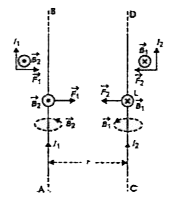WHat is the direction of force between two parallel conductors carrying current in opposite direction?Solution in Punjabi
Let we have two infinitely long parallel conductors AB and CD.
I1andI2 be the current flowing through AB and CD respectively.
r = distance between the conductors
B1=μ04p2I1r= Magnetic field produced due to current I1 flowing through AB at any point L on the conductor CD.
The direction of magnetic field B1 is perpendicular to the plane of the paper and is directed into the plane (by right hand screw rule).Thus, the conductor CD (through which current I1 is flowing ) lies in the magnetic field →B1 whic is perpendicular to the length of the conductor. Therefore, conductor CD will experience a sideways force on account of the external field B1 and the force experienced per unit length of the conductor CD in the magnetic field B1 is given by
F2=B1I2×1=B1I2
Using the value of B1 in eqn (1) we have
F2=μ04π2I1I2r
Applying Fleming.s left hand rule, we find that force F2 on conductor CD lies in the plane of the paper perpendicular to conductor CD and is directed towards the conductor AB
Similarly, it can be proved that conductor AB also experiences a force due to current I2 in CD and is given by F1=μ04π2I1I2r, which lies in the plane of paper and perpendicular to conductor AB and is directed towards the conductor CD.
But F1andF2 are equal and opposite forces and hence these conductors attract each other. If the two conductors carry the current in opposite direction, then these conductors repel each other.
Definition of ampere :
F=μ04p2I1I2r
IF I1=I2=I ampere, r = 1 m and μ04π=10−7Nm−1
One Ampere : One ampere is that steady which when maintained in each of the two infinitely long straight parallel conductors of negligible circular cross section, placed one metre apart in free space, would attract or repel each other with a force of 2×10−7 newton per metre of their lengths.

Topper's Solved these Questions
- FORCE ON A CURRENTBOOK - BETTER CHOICE PUBLICATIONCHAPTER - FORCE ON A CURRENTEXERCISE - SHORT ANSWER TYPE QUESTIONS (MOST EXPECTED QUESTIONS)
5 Videos
- FORCE ON A CURRENTBOOK - BETTER CHOICE PUBLICATIONCHAPTER - FORCE ON A CURRENTEXERCISE - LONG ANSWER TYPE QUESTIONS
15 Videos
- FORCE ON A CURRENTBOOK - BETTER CHOICE PUBLICATIONCHAPTER - FORCE ON A CURRENTEXERCISE - VERY SHORT ANSWER TYPE QUESTIONS (MOST EXPECTED QUESTIONS )
5 Videos
- FORCE ON A CHARGE BOOK - BETTER CHOICE PUBLICATIONCHAPTER - FORCE ON A CHARGE EXERCISE - NUMERICAL PROBLEMS
14 Videos
- GAUSS'S THEOREMBOOK - BETTER CHOICE PUBLICATIONCHAPTER - GAUSS'S THEOREMEXERCISE - MOST EXPECTED NUMERICALS
4 Videos
Similar Questions
What is a safety fuse? Explain its function.
View SolutionState the principle of moving coil galvanometer?
View SolutionDefine an ampere in terms of the force between current carrying conductors.
View SolutionAn electron (with charge 1.6×10−19C) moving at right angles to a uniform magnetic field completes a circular orbit in 10−6sec. Calculate the vlaue of magnetic field. Given mass of electron =9×10−31kg.
View SolutionA box encloses an electric dipole of 3μCand−3C, if the dipole length is 6 cm, then find total electric flux associated with box.
View SolutionFind the force between two parallel conductors carrying currents (i) in the same direction (ii) in opposite directions and hence define one ampere.
View SolutionThe two linear parallel conductors carrying currents in the opposite direction…………………each other.
View SolutionIf current in two parallel wires flow in opposite directions, the force between the wires will:
View Solutionरिक्त स्थानों की पूर्ति कीजिए-
दो समान्तर धारावाही चालकों में यदि एक ही दिशा में धारा प्रवाहित होता है तो उनके मध्य ……. बल तथा विपरीत दिशा में धारा प्रवाहित होने पर, ……… बल लगता है।
View Solutionसमान दिशा में धारावाही दो समान्तर चालकों के मध्य बल ........ प्रकृति का होता है ।
View SolutionWhat is the nature of force between two parallel wires carrying current in opposite directions?
View SolutionWhat is the nature of force between two parallel wires carrying current in same direction?
View Solutionएक दिशीय धारा वाले दो समांतर चालकों के बीच आकर्षण बल लगने का कारण है
View SolutionTwo linear paraller conductors caryyng currents in the same direction …………………each other but conductors carrying currents in mutually opposite directions …………………. .
View SolutionWHat is the direction of force between two parallel conductors carrying current in same direction
View SolutionWHat is the direction of force between two parallel conductors carrying current in opposite direction?
View Solution
